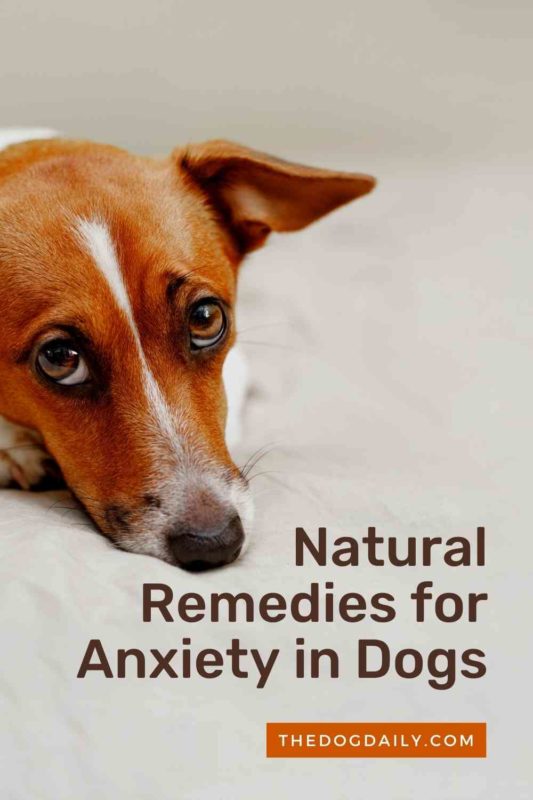Dog Anxiety
You know your fur baby better than anyone else. You know when he’s happy when he’s bored, when he’s relaxed… and you know when he’s feeling anxious or scared.
Anxiety is just as common in dogs as it is in humans, and it can have a significant impact on your best buddy’s quality of life. It might even prevent him from enjoying walks around the neighborhood and other fun dog activities.
Dogs with anxiety might become so stressed when you’re away that they become destructive, possibly even causing harm to themselves or your home. They might bark or whine incessantly, causing issues with your neighbors.
Yep, the signs of anxiety in dogs are often pretty obvious. And as a loving pet parent, of course, you want to help your baby relax and enjoy life. Before you turn to pharmaceuticals, why not consider these natural supplements for relieving anxiety in dogs?
Understanding a Dog with Anxiety
Before you can begin to treat your dog’s anxiety with natural remedies, it’s helpful to know what’s causing it in the first place.
Dogs can suffer from two different types of anxiety, situational and behavioral.
-
Situational Anxiety:
When your dog is afraid of specific experiences, he’s dealing with situational anxiety. Common triggers can include car rides, thunderstorms, fireworks, and going to the vet or groomer. With situational anxiety, the symptoms go away once the dog is no longer exposed to that particular situation.
-
Behavioral Anxiety:
Behavioral anxiety is an ongoing issue that the dog deals with daily. According to experts at Bond Vet in New York City, separation anxiety is the most common behavioral anxiety that pet parents deal with. It’s triggered by being left alone, even for just a few minutes. In many cases, behavioral anxiety is related to past trauma, abuse, moving to a new home, or losing a human or animal that the dog was very close to.
5 Natural Remedies for Anxiety in Dogs and How They Work
1. Flower Essences
Flower essences are an excellent natural remedy for anxiety in dogs. They can help restore emotional balance, relieve stress, and restore calm.
The wonderful thing about flower essences is that they’re non-toxic, gentle, and they can’t be overdosed. They are unscented, dilute liquids that contain the essences of healing flowers.
Use them to rebalance your dog’s emotions and bring him back to a more naturally balanced state. They can reduce stress and anxiety, improve confidence, and minimize many negative behaviors, including separation anxiety.
While many of the other remedies on our list address your dog’s physical responses to anxiety, flower essences address and stabilize the emotional component. You can combine up to six essences at a time, depending on your dog’s emotional triggers. You can also use them in conjunction with other natural remedies.
Here are a few to consider:
- Rescue Remedy: Rescue Remedy is an excellent choice for relieving anxiety. It contains five flower essences that work together to alleviate stress during traumatic events.
- Aspen: Aspen is an excellent choice for dogs who suffer from general anxiety and jitteriness, especially when the owner is preparing to leave the house.
- Mimulus: Use Mimulus when there has been a frightening experience in the home or when your dog is feeling insecure about being left alone.
- Rock Rose: Choose Rock Rose when your dog is experiencing outright fear or panic.
2. Homeopathic Medicine
Homeopathic remedies target very specific symptoms. Once you’ve pinpointed the cause of your dog’s fear, you can use a homeopathic remedy to give him fast relief.
Here are a few to consider:
- Aconite 30c: Aconite is an excellent remedy to try if you’re not sure where to start. It’s a good choice for fear in general and can be administered every 15 minutes during a stressful situation. However, if you don’t see improvement, you should try a different remedy.
- Phosphorus 30c: Phosphorus is recommended for noise phobias and can be administered up to twice per day.
- Gelsemium 6c or 30c: Gelsemium is one to try if your dog has separation anxiety.
In general, you should start with three doses of your chosen remedy. Administer them 12 hours apart and discontinue use when the symptoms subside or the dog stops responding to the treatment.
Be aware that homeopathic remedies can produce side effects or even worsen symptoms if the wrong remedy is used. It’s best to consult with a qualified vet for proper diagnosis and to ensure that the correct remedy is being administered.
3. CBD
CBD has been getting a lot of press lately, and it does have many benefits for canines. It has been used to help with seizures, pain management, and even cancer. It’s also highly effective for treating anxiety.
CBD works through receptors in the central nervous system, called the endocannabinoid system. Dogs naturally release endocannabinoid chemicals on their own. When these chemicals connect with endocannabinoid receptors, they stimulate the body’s natural release of serotonin, a mood stabilizer.
Science shows that CBD oil increases serotonin release, helping to calm and soothe the dog’s anxiety naturally. It’s an excellent solution for situational anxiety because it works quickly.
For example, if you know your dog is scared of storms and there’s one on the way, you can give him CBD oil 30 minutes to an hour before the storm is expected. It will help the dog remain calm and relaxed until the storm passes.
CBD oil can be added to food or placed directly in the dog’s mouth following the label’s dosage instructions. Be aware that CBD may cause drowsiness, lower pressure, and other issues in some dogs. Be sure to follow dosage instructions carefully and discontinue use if your dog experiences side effects.
4. Essential Oils
Essential oils like lavender, chamomile, hemp, and violet are excellent for calming anxiety. They can be diluted and sprayed onto your dog’s bed, or you can diffuse them into the air.
However, it’s important to remember that dogs are more sensitive to smells than humans. Make sure your dog has a way to leave the area if a fragrance makes him uncomfortable. Observe him for any adverse reaction and be prepared to remove the oil immediately if necessary.
Some essential oils can be very toxic to dogs and cats, even when they’re diffused or diluted. Be sure to do your research before using them around your pets, and never apply them directly to your pet’s skin or allow him to ingest them.
5. Herbs
Many herbs are safe for dogs and can be used to soothe their anxiety symptoms. Here are a few to consider.
- Chamomile: We’ve all heard of drinking chamomile tea before bed, and it’s safe for dogs too. It’s a gentle herb with mild sedative effects. It also has a soothing effect on the stomach, so it’s perfect for dogs with anxiety during car rides who also get car sick.
- St. John’s Wort: St. John’s Wort is considered to be a safe and effective alternative to antidepressant and anti-anxiety drugs. It’s an excellent solution for dogs with behavioral anxiety, especially separation and other fear-based anxieties.
- Valerian: Valerian also works as a sedative. It promotes physical relaxation and calms the nerves. It’s a good option for dogs who get overexcited or hysterical when facing stressful events.
These herbs can be administered to your dog as a tea, tincture, or capsule. Be sure to consult with your vet for dosage instructions. You should also talk to your vet first if your dog has a health condition or takes medication. Some herbs can worsen health issues, cause drug interactions, or interfere with a medication’s effectiveness.
Other Options for Treating Anxiety in Dogs without Medication
Using Natural Remedies for Anxiety in Dogs
It’s always a good idea to consult with your vet to ensure that your dog isn’t dealing with an underlying health issue that may be contributing to his anxiety symptoms. However, once your vet confirms anxiety, he will probably want to prescribe an anti-anxiety medication.
Be aware that these drugs come with various side effects that may be just as bad as, or even worse than, your dog’s anxiety symptoms. Unfortunately, many of these drugs can also result in withdrawal symptoms, especially if you use them long-term or stop using them abruptly.
That’s why it’s worth trying natural alternatives to safely calm your dog’s anxiety first. Flower essences are an excellent option because they’re so safe, and they work to re-balance your dog’s emotions, providing long-term relief without harmful medication or side effects.
Article written by Author: Nicole McCray

